简体中文
繁體中文
English
Pусский
日本語
ภาษาไทย
Tiếng Việt
Bahasa Indonesia
Español
हिन्दी
Filippiiniläinen
Français
Deutsch
Português
Türkçe
한국어
العربية
Key Risks and Downsides of Forex Trading Explained
Abstract:Discover the key risks and downsides of forex trading, including market volatility, leverage dangers, and emotional challenges. Learn how to trade wisely.
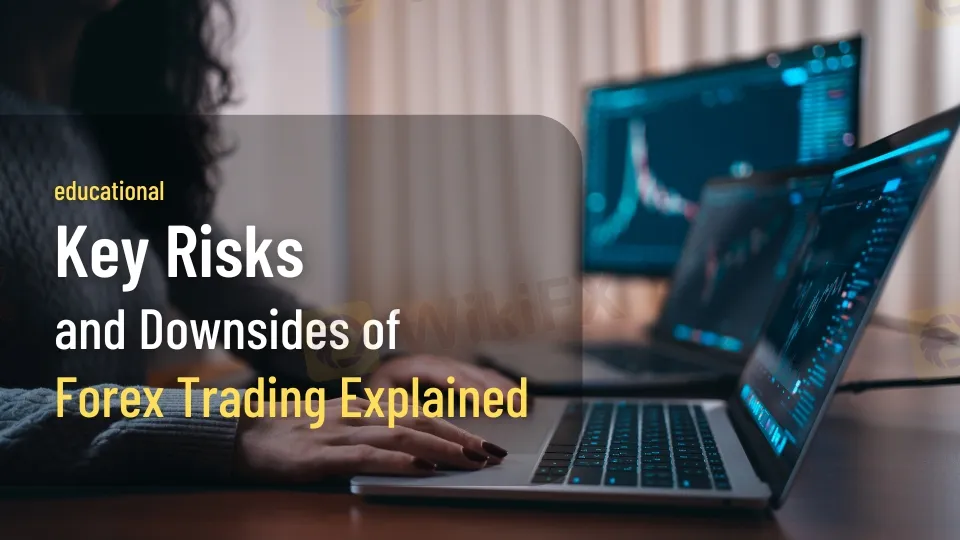
Forex trading, or the act of buying and selling currencies on the foreign exchange market, is one of the most popular types of investment globally. With a daily trading volume of more than $6 trillion, it provides several prospects for profit. However, forex trading, like any other financial enterprise, carries major dangers and drawbacks that all traders must be aware of before getting involved. This essay delves into the major dangers and drawbacks of forex trading, offering information to assist you navigate this complicated market.
1. Market Volatility is a Double-edged Sword
One of the most obvious hazards in FX trading is market volatility. Currency values vary regularly in response to geopolitical events, economic data releases, and market sentiment. While volatility can provide profits, it can also result in significant losses.
Unexpected news, such as political instability or natural calamities, can result in abrupt and significant price movements. Traders who fail to foresee or respond swiftly to these movements risk losing their positions in minutes. This volatility makes forex trading especially difficult for newbies.
Key Takeaway: Use risk management measures, such as stop-loss orders, to safeguard assets from market volatility.
2. Leverage is a Powerful yet Dangerous Tool
Leverage is a characteristic that enables traders to manage huge positions with a little amount of cash. While this can boost earnings, it also increases losses. Forex brokers often provide leverage rates of up to 500:1, allowing a $1,000 investment to control a 500,000 position.
However, large leverage can swiftly empty your account if the market turns against you. For example, a 1% negative price movement with 100:1 leverage might result in a complete loss of your initial investment. This makes leverage one of the most important disadvantages of forex trading, particularly for new traders.
Key Takeaway: Use leverage with caution and know its repercussions. Consider beginning with lower leverage levels to reduce risk.
3. Emotional Trading: A Psychological Challenge
Forex trading is more than just statistics and charts; it's also a mental game. Emotions such as fear, greed, and overconfidence can impair judgment and result in bad decisions. For example, a trader may stick to a lost position in the hopes of a comeback, only to see losses grow.
Similarly, the fear of missing out (FOMO) might lead traders to initiate positions without sufficient research, raising the risk of loss. Emotional trading is one of the most typical causes for forex traders to fail.
Key Takeaway: Create a disciplined trading plan and stick to it. Avoid making impulsive, emotional decisions.
4. Lack of Regulation: A Hidden Risk
The FX market is decentralized, which means it works without a central exchange. While this enables 24-hour trade, it also provides an opportunity for fraudulent activity. Some brokers lack sufficient regulation, putting traders' cash in danger.
Unregulated brokers may engage in unethical behavior such as price manipulation, requoting, or refusing to execute withdrawals. This lack of monitoring is a major disadvantage of forex trading, especially for retail traders.
Key Takeaway: Choose a broker licensed by respected agencies, such as the Financial Conduct Authority (FCA) or the Commodity Futures Trading Commission.
5. Complexity and Learning Curve
Technical analysis, fundamental analysis, and macroeconomic indicators are all important aspects to learn while trading forex. The intricacy of these concepts can be intimidating for newcomers, resulting in expensive blunders.

For example, misinterpreting a chart pattern or disregarding important economic news might lead to bad trading judgments. Furthermore, the vast amount of information available might make it difficult to identify credible sources.
Key Takeaway: Prioritize knowledge and practice using a demo account before trading real money.
6. High Costs and Fees
While forex trading is sometimes advertised as a low-cost option, it is fraught with hidden costs that can cut into earnings. These include spreads (the difference between the bid and ask prices), commissions, and overnight financing fees.
For example, a broker may provide tight spreads but charge hefty charges, raising the entire cost of trading over expectations. Additionally, maintaining holdings overnight might result in exchange costs, which can accumulate over time.
Compare brokers and understand their pricing structures before creating an account. Look for clear pricing with no hidden fees.
7. Scams and Fraudulent Schemes
The forex market is plagued with frauds aimed at naive traders. These include fraudulent brokers, signal sellers, and automated trading systems that guarantee exaggerated profits. Many traders fall prey to these frauds and lose their hard-earned money.
For example, a dishonest broker may manipulate trading systems to cause clients to lose money, whereas a signal seller may supply false or out-of-date information.
Key Takeaway: Avoid claims of guaranteed earnings. Before putting your faith in any forex service or people, conduct extensive investigation.
8. Time-Consuming Nature
Forex trading demands continual market monitoring, particularly for short-term traders. This can be time-consuming and frustrating, especially for individuals who have full-time jobs or other responsibilities.
Swing traders and long-term investors may find it simpler to manage their time, but they must still keep current on market movements. The rigorous nature of forex trading is a major disadvantage for many people.
Key Takeaway: Choose a trading method that works with your schedule and lifestyle. If you don't have much time, look into automatic trading solutions.
9. Currency Risk for Global Markets
Forex trading entails dealing with various currencies, each of which is impacted by its own country's economic and political situations. Interest rate, inflation, and government policy changes can all have an influence on currency prices, posing extra concerns.
For example, a trader with a stake in a currency affected by a rapid interest rate drop may suffer big losses. The currency risk is an inherent disadvantage of forex trading.
Key Takeaway: To reduce currency risk, diversify your portfolio and monitor global economic events.
10. Overreliance on Technology
While technology has increased the accessibility of forex trading, it has also introduced new hazards such as system breakdowns, connectivity concerns, and cyberattacks. A technological problem at a key trading time might lead to missed chances or unexpected losses.
For example, a platform outage during a major news event may prohibit you from closing a position, resulting in significant losses.
Key Takeaway: Make a backup plan in case of technical concerns, such as utilizing a different device or broker.
Conclusion: Weighing the Risks and Rewards
Forex trading has the potential for large gains, but it also carries major risks and drawbacks. To succeed, traders must traverse a complicated terrain that includes market volatility and leverage risk, as well as emotional hurdles and frauds.
Understanding these risks and using solid risk management tactics will increase your chances of success in the FX market. Remember that knowledge and discipline are your greatest allies in this high-stakes atmosphere.

Disclaimer:
The views in this article only represent the author's personal views, and do not constitute investment advice on this platform. This platform does not guarantee the accuracy, completeness and timeliness of the information in the article, and will not be liable for any loss caused by the use of or reliance on the information in the article.
Read more
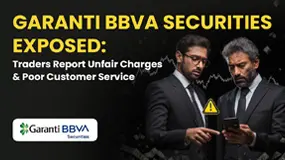
Garanti BBVA Securities Exposed: Traders Report Unfair Charges & Poor Customer Service
Have you been financially ruined through chargebacks allowed by Garanti BBVA Securities? Do you have to wait for hours to get your queries resolved by the broker’s customer support official? Did the same scenario prevail when you contact the officials in-person? Failed to close your account as Garanti BBVA Securities officials remained unresponsive to your calls? Many have expressed similar concerns while sharing the Garanti BBVA Securities review online. In this article, we have shared some complaints against the broker. Take a look!
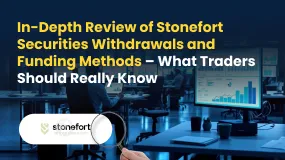
In-Depth Review of Stonefort Securities Withdrawals and Funding Methods – What Traders Should Really
For any experienced forex and CFD trader, the mechanics of moving capital are as critical as the trading strategy itself. The efficiency, security, and transparency of a broker's funding procedures form the bedrock of a trustworthy, long-term trading relationship. A broker can offer the tightest spreads and the most advanced platform, but if depositing funds is cumbersome or withdrawing profits is a battle, all other advantages become moot. This review provides a data-driven examination of Stonefort Securities withdrawals and funding methods. We will dissect the available information on payment options, processing times, associated costs, and the real-world user experience. Our analysis is anchored primarily in data from the global broker regulatory inquiry platform, WikiFX, supplemented by a critical look at publicly available information to provide a comprehensive and unbiased perspective for traders evaluating this broker.
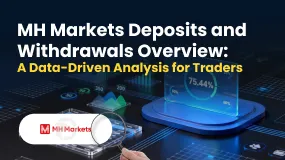
MH Markets Deposits and Withdrawals Overview: A Data-Driven Analysis for Traders
For any experienced trader, the integrity of a broker is not just measured by its spreads or platform stability, but by the efficiency and reliability of its financial plumbing. The ability to deposit and, more importantly, withdraw capital without friction is a cornerstone of trust. This review provides an in-depth, data-driven analysis of the MH Markets deposits and withdrawals overview, examining the entire fund management lifecycle—from funding methods and processing speeds to fees and potential obstacles. MH Markets, operating for 5-10 years under the name Mohicans Markets (Ltd), has established a global footprint. With a WikiFX score of 7.08/10, it positions itself as a multi-asset broker offering a range of account types and access to the popular MetaTrader platforms. However, for a discerning trader, the real test lies in the details of its payment systems and the security of their funds. This article dissects the MH Markets funding methods withdrawal experience, leveraging pr
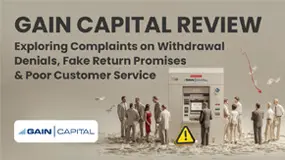
GAIN Capital Review: Exploring Complaints on Withdrawal Denials, Fake Return Promises & More
Is your forex trading experience with GAIN Capital full of financial scams? Does the broker disallow you from withdrawing your funds, including profits? Have you been scammed under the guise of higher return promises by an official? Does the GAIN Capital forex broker not have an effective customer support service for your trading queries? Concerned by this, many traders have shared negative GAIN Capital reviews online. In this article, we have discussed some of them. Read on!
WikiFX Broker
Latest News
The 350 Per Cent Promise That Cost Her RM604,000
In-Depth Uniglobe Markets Commission Fees and Spreads Analysis – What Traders Should Really Know
WikiFX's New Evaluation of ATM Capital LTD: Does its License Protect the Arab Investor?
Is Axi Legit? A Data-Driven Analysis of Its Regulatory Standing and Trader Feedback
How a Fake Moomoo Ad Led to the “New Dream Voyage 5” Scam
FXPesa Review: Are Traders Facing High Slippage, Fund Losses & Withdrawal Denials?
Trive Investigation: High Score, Hidden Risk - The Profit Paradox
CMC Markets Australia Revenue Surges 34%, But High-Net-Worth Clients Face Tax Phishing Threat
"Just 9 More Lots": Inside the Endless Withdrawal Loop at Grand Capital
GCash Rolls Out Virtual US Account to Cut Forex Fees for Filipinos
Currency Calculator



